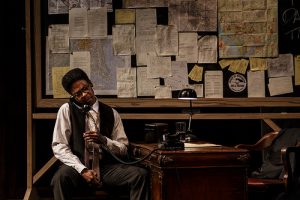The Man Behind the March, An Ode in La Jolla to Bayard Rustin
How thrilling, how inspirational, how majestic seem now those sweltering summer days of 1963 when a complex coalition of black Americans came together on the mall in Washington, D.C., to at last launch the righting of wrongs dating back through the Civil War to the Declaration of Independence itself!
From this distance in time, after the endless waves of respect and awed admiration, it all seems so inevitable, so monumentally triumphant, even though it so obviously isn’t settled even yet.
That summer, certainly to those of us sunk deep in the sullen South, it seemed a miracle that so many gathered so peacefully to demand such unified and coherent goals.

Michael Benjamin Washington as Bayard Ruskin in La Jlla Playhouse Blueprints to Freedom. Jim Carmody Photo
There were 200,000 people there. The pictures didn’t lie. And somehow, they came and went in eloquent peace. The time of the bullets was still ahead, the Kennedys were in the White House and the Rev. King was on the podium. But the pressures were building, making this amazing Washington event all the more portentous.
Who did all this, anyway? Martin Luther King Jr. was the face becoming ubiquitous but there were plenty of other names – James Farmer, Roy Wilkins, A. Phillip Randolph, John Lewis – and organizations from the NAACP, Urban League and the AFL-CIO to CORE, SCLC and SNCC. What was the tie that bound?
[themify_box style=”yellow note rounded” ]”a reverent celebration”[/themify_box]
Michael Benjamin Washington’s new play Blueprints to Freedom, now at the La Jolla Playhouse, traces the specific leadership back to one man, the black, gay, ex-communist, draft-resisting Quaker, Broadway actor and singer of Elizabethan art songs, Bayard Rustin.
To say that someone with Rustin’s bio was an unlikely leader of a popular mass movement in the early 1960s would be a serious understatement. Yet the March organizers apparently relied upon his strength, courage and determination almost without interference. And, never violating his pacifist principles, he delivered.
True, everybody agreed that he had to be kept more or less out of sight. But history hasn’t forgotten him and Washington’s play, subtitled “An Ode to Bayard Rustin,” is intended to keep it that way.
Odes, however, are something different from stage dramas: More respectful, more lyrical and usually more lofty than dramatic. And that’s the case here. This show is interesting and gripping but more of a reverent celebration than a conflict resolved.
The author plays the subject with noble bearing and keen confidence. Antonio T. J. Johnson makes Randolph a shrewd elder, proudly hands-off at the sweet results he’s getting from his handpicked operative.
Ro Boddie, eerie in his resemblance to the martyred icon, plays the Rev. King as Christ at Gethsemane, agonizing at his burden, haunted by premonitions, uncertain of the exact next step: “Maybe I shouldn’t mention my dream…”
(Randolph asks Rustin why King is speaking so late in the program. “Remember vaudeville?” Rustin reminds him. “The featured act goes on next-to-last. And I guarantee that no reporters will leave before he speaks.”)
Mandi Masden plays a pert intern who learns efficiency but teaches feminism and Mat Hostetler has an effective scene as an ex-lover who shows up just in case Rustin needs support.
The play could use some more bodies, or Neil Patel’s grainy period set could concentrate the action down to a more intimate scale (though the suggested vistas of the Washington Mall are quite stirring). Beth Goldenberg’s costumes are wisely meticulous in their period accuracy.
There’s really little staging required from Lucie Tiberghien. Washington the dramatist has so much to say that he often pumps out overlapping dialogue hoping that enough sticks to make most points. This has limited success, given the complexity of the story and the determination of the author to get it all in. Tiberghien soldiers on through the exposition and postpones characterization for the tighter focus of the gathering climax, probably the wisest approach.
This is hardly a play for the ages but I am grateful for the chance to get even such a worshipful introduction to such an extraordinary individual. Somehow, Rustin’s humanity in reinforced ultimately not so much by the Medal of Freedom from President Obama as from the praise, near the end of Rustin’s restless life, from President Reagan, who congratulated him on his growing neo-conservatism.
(Continues in the Potiker Theatre at 7:30 p.m. Tuesdays and Wednesdays; at 8 p.m. Thursdays-Saturdays; at 2 p.m. Saturdays and Sundays; and at 7 p.. Oct. 4, 2015.)

Welton Jones has been following entertainment and the arts around for years, writing about them. Thirty-five of those years were spent at the UNION-TRIBUNE, the last decade was with SANDIEGO.COM.


